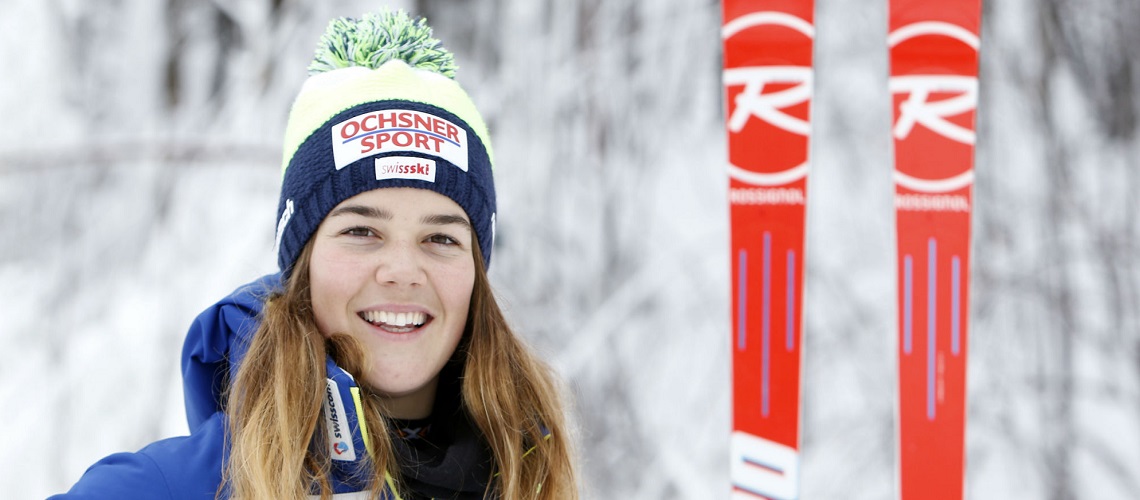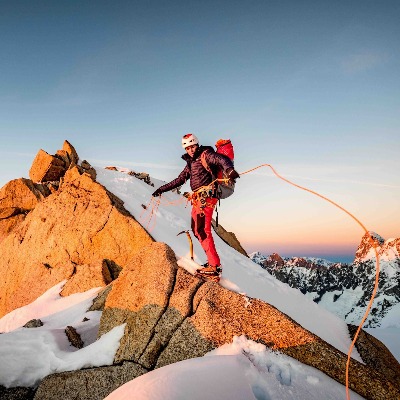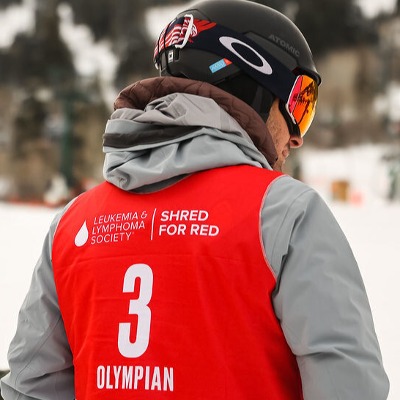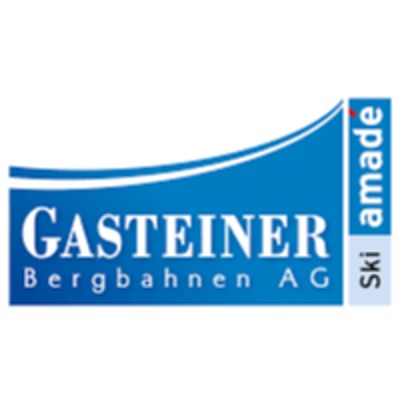FIS Q&A With Mélanie Meillard

Switerland's rising star Mélanie Meillard suffered a season-ending injury just before the 2018 Olympic Winter Games, but now she's well on her way back. FIS asked her questions about her past successes and also what lies ahead.
Since your Youth Olympic Champion title in 2016, we had you on the short list as a rising star. It didn’t last long until you proved what you are capable of on the World Cup Tour, as you scored an incredible 6th place in the slalom in Levi on the same year. You were 18, it was your 4th World Cup race. Did you expect such a good result at that point?
Not at all! My goal was to enjoy and get some experience on the highest level. I hoped to qualify for the second run, but didn’t expect to finish sixth!
How did you feel when you crossed the finish line?
I was very surprised and couldn’t believe that I had achieved such a result. When I saw the timing board, I didn’t know how to react. It was new for me. I was so happy.
Did you realise what a huge step you had made?
Not really, not right away. But when I looked back later on, it was a milestone that changed a lot for the rest of the season. It also gave me a lot of self-confidence.
From then on, things moved very fast for you. You joined the World Cup training group and became a regular on the World Cup Tour. By the end of the season you had cracked the Top 30 Overall, finishing 10th of the slalom standings and 20th in giant slalom. How was the integration in this new environment?
I had to learn a lot as the races went on, but it was very interesting and the integration in my new team wasn’t a problem at all.
There is a lot happening around skiing on the World Cup tour, was it easy for you to adapt to all these additional duties?
I can’t say that it was easy, but I was very well taken care of, so I could adapt quickly. Of course, it’s very different from the European Cup. On the World Cup tour there are bib draws, interviews, oversea travels, etc., but it’s a matter of being well organized to optimize every moment.
What did you like the most in your new life?
I like to travel, to discover new places and to do what I love in different ski resorts.
On New Year’s day of 2018, you claimed your first World Cup podium in the City Event in Oslo. What went through your mind when you were at the start of the small final racing for a World Cup podium?
I tried to stay calm, not to put additional pressure on my shoulders. I told myself that it was already huge to be in the semi-finals. But I had the opportunity to claim my first World Cup podium, so I had to push hard and give all I have to reach my goal.
How was it to see the green light at the bottom and realise that you made it?
When I passed the finish line and saw the green light, a dream came true. I had my first podium in career.
You had to compete against your teammate Wendy Holdener in the semi-final and against local hero Frida Hansdotter in the fight for third place. Was it more intimidating or motivating?
It was a great motivation for me to know that I could keep up with them.
What makes you strong in this particular discipline?
To have a skier just next to me on a parallel course is pushing me to catch up with her if I’m late or to keep pushing if I know she’s behind. It makes me go even faster.
In this meteoric rise, you qualified for your first Olympic Games. But shortly before the Opening Ceremony in PyeongChang, you injured yourself in giant slalom training, tore your ACL and damaged your meniscus. A brutal fall from a height. How did the accident happen?
It was on our first training day in Korea. In my second run, around the middle of the course. I made a mistake, got into the backseat, and fell in a rotation. Then I slid backwards into the nets, feeling a huge pain in my knee.
How big was the disappointment and how did you cope with it?
It was very hard, a huge disappointment to get injured right before my first Olympic Winter Games. I was very sad. I had guilt feeling and asked myself a lot of questions. But anyway, it was as it was and I couldn’t change anything to the fact that I had torn my ACL, so I tried to look at the bright side of things. But for sure it wasn’t easy.
Are you all right now, able to look ahead again?
Yes, I’m better now. It’s still too early to say when I will be able to compete again, but slowly I start to be able to look ahead and see that it’s possible to come back strong.
What is the timeline in your rehabilitation process?
A few weeks after my surgery, my dryland coach, my physiotherapist, my doctor, my coaches and me made a schedule for my rehabilitation. I started with lots of physiotherapy to recover as good as possible from the surgery. Then, after six weeks, I slowly started to train again in the gym. Along the way, we adapted the rehab to how my knee could cope with it.
You are still young, we have no doubt that you will comeback from this injury and earn many more podiums and medals. What will you focus on when you’ll be back on skis?
The goal is to find confidence again and to control all my movements. I focus on being able to train and ski without pain.
Did you set any concrete goals already?
I would like to come back at the level I had before my injury.
What are your overall career goals as a skier?
I dream about a medal at a big event (Olympic Winter Games or World Championships) and claim a crystal globe. But it’s a long way and I’m just at the beginning of my career.
You and your brother Loïc, who is performing well in slalom and giant slalom on the World Cup follow the same career, are following the same career. Is there a family secret that makes the Meillard so strong?
There is no secret. We’ve always been very involved in sports and when we want something we do everything to reach our goal.
What do you think were the key points in your education that led to this success?
When we were kids, we were very active together with our parents. We skied a lot and practiced many other sports as well. This was very helpful later on.
Is it a healthy rivalry between the two of you?
There is no reality or jealousy between us. We are always happy when the other one has a good result. Also, we know that we can count on each other if anything is not working well.













